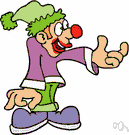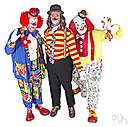clown
(redirected from clowns)Also found in: Thesaurus, Acronyms, Idioms, Encyclopedia.
clown
(kloun)n.
1.
a. A buffoon or jester who entertains by jokes, antics, and tricks in a circus, play, or other presentation.
b. One who jokes and plays tricks.
2. A coarse, rude, vulgar person; a boor.
3. A peasant; a rustic.
intr.v. clowned, clown·ing, clowns
1. To behave like a buffoon or jester.
2. To perform as a buffoon or jester.
3. To krump, especially in clown makeup.
[Of Scandinavian origin (akin to Icelandic klunni, clumsy person) or of Low German origin.]
clown′er n.
clown′ish adj.
clown′ish·ly adv.
clown′ish·ness n.
American Heritage® Dictionary of the English Language, Fifth Edition. Copyright © 2016 by Houghton Mifflin Harcourt Publishing Company. Published by Houghton Mifflin Harcourt Publishing Company. All rights reserved.
clown
(klaʊn)n
1. (Theatre) a comic entertainer, usually grotesquely costumed and made up, appearing in the circus
2. (Theatre) any performer who elicits an amused response
3. someone who plays jokes or tricks
4. a person who acts in a comic or buffoon-like manner
5. a coarse clumsy rude person; boor
6. archaic a countryman or rustic
vb (intr)
7. to perform as a clown
8. to play jokes or tricks
9. to act foolishly
[C16: perhaps of Low German origin; compare Frisian klönne, Icelandic klunni clumsy fellow]
ˈclownery n
ˈclownish adj
ˈclownishly adv
ˈclownishness n
Collins English Dictionary – Complete and Unabridged, 12th Edition 2014 © HarperCollins Publishers 1991, 1994, 1998, 2000, 2003, 2006, 2007, 2009, 2011, 2014
clown
(klaʊn)n.
1. a comic performer, esp. in a circus, who wears an outlandish costume and makeup and pantomimes common situations in exaggerated fashion, often also juggling, tumbling, etc.
2. a joker or buffoon; jester.
3. a prankster or practical joker.
4. Slang. a boor, oaf, or fool.
5. a peasant; rustic.
v.i. 6. to act like a clown.
[1555–65; earlier cloyne, clowne, perhaps akin to Old Norse klunni boor, dial. Dan klunds, dial. Swedish klunn log]
clown′ish, adj.
clown′ish•ly, adv.
clown′ish•ness, n.
Random House Kernerman Webster's College Dictionary, © 2010 K Dictionaries Ltd. Copyright 2005, 1997, 1991 by Random House, Inc. All rights reserved.
clown
Past participle: clowned
Gerund: clowning
| Imperative |
|---|
| clown |
| clown |
Collins English Verb Tables © HarperCollins Publishers 2011
ThesaurusAntonymsRelated WordsSynonymsLegend:
Switch to new thesaurus
| Noun | 1. |  clown - a rude or vulgar fool clown - a rude or vulgar fool |
| 2. |  clown - a person who amuses others by ridiculous behavior clown - a person who amuses others by ridiculous behaviorharlequin - a clown or buffoon (after the Harlequin character in the commedia dell'arte) jester, motley fool, fool - a professional clown employed to entertain a king or nobleman in the Middle Ages whiteface - a clown whose face is covered with white make-up zany - a buffoon in one of the old comedies; imitates others for ludicrous effect | |
| Verb | 1. |  clown - act as or like a clown clown - act as or like a clown |
Based on WordNet 3.0, Farlex clipart collection. © 2003-2012 Princeton University, Farlex Inc.
clown
noun
1. comedian, fool, comic, harlequin, joker, jester, prankster, buffoon, pierrot, dolt a classic circus clown with a big red nose and baggy suit
2. fool, dope (informal), jerk (slang, chiefly U.S. & Canad.), idiot, ass, berk (Brit. slang), prat (slang), moron, twit (informal, chiefly Brit.), imbecile (informal), ignoramus, jackass, dolt, blockhead, ninny, putz (U.S. slang), eejit (Scot. & Irish), thicko (Brit. slang), doofus (slang, chiefly U.S.), lamebrain (informal), numbskull or numskull I could do a better job than those clowns in Washington.
verb
1. (usually with around) play the fool, mess about, jest, act the fool, act the goat, play the goat, piss about or around (taboo slang) He clowned a lot and anatagonized his workmates. Stop clowning around and get some work done.
Collins Thesaurus of the English Language – Complete and Unabridged 2nd Edition. 2002 © HarperCollins Publishers 1995, 2002
clown
nounverb
Informal. To make jokes; behave playfully.Also used with around:
Informal: fool around, fun.
The American Heritage® Roget's Thesaurus. Copyright © 2013, 2014 by Houghton Mifflin Harcourt Publishing Company. Published by Houghton Mifflin Harcourt Publishing Company. All rights reserved.
Translations
مُهَرِّجيُهَرِّج، يَتَصَرَّف كالمُهَرِّجبَهْلول، مُضْحِك
klaunšašekchovat se jako šašekkašpar
klovnnar
klovni
klaun
bohócbohóckodik
fífl, trúîurfíflasttrúîur
ピエロ
어릿광대
juokdariškasjuokus krėstiklounaskomiškaskomiškas žmogus
ākstītiesākstsklauns
klaunrobiť šašoviny
klovn
clownpajas
ตัวตลก
chú hề
clown
[klaʊn]A. N
Collins Spanish Dictionary - Complete and Unabridged 8th Edition 2005 © William Collins Sons & Co. Ltd. 1971, 1988 © HarperCollins Publishers 1992, 1993, 1996, 1997, 2000, 2003, 2005
Collins English/French Electronic Resource. © HarperCollins Publishers 2005
clown
n (in circus etc) → Clown m; (inf) (= foolish person also) → Kasper m, → Hanswurst m; (pej) → Idiot m, → Trottel m; to act the clown → den Clown or Hanswurst spielen, herumkaspern (inf)
vi (also clown about or around) → herumblödeln (inf) → or -kaspern (inf)
Collins German Dictionary – Complete and Unabridged 7th Edition 2005. © William Collins Sons & Co. Ltd. 1980 © HarperCollins Publishers 1991, 1997, 1999, 2004, 2005, 2007
clown
[klaʊn]1. n (in circus) → pagliaccio, clown m inv (fam) → buffone m
2. vi (also clown about or around) → fare il buffone or il pagliaccio
Collins Italian Dictionary 1st Edition © HarperCollins Publishers 1995
clown
(klaun) noun1. a person who works in a circus, performing funny acts (usually ridiculously dressed).
2. any person who behaves ridiculously.
verb to behave ridiculously. Stop clowning.
ˈclownish adjectiveKernerman English Multilingual Dictionary © 2006-2013 K Dictionaries Ltd.
clown
→ مُهَرِّج klaun klovn Clown κλόουν payaso klovni clown klaun pagliaccio ピエロ 어릿광대 clown klovn klown palhaço клоун clown ตัวตลก palyaço chú hề 小丑Multilingual Translator © HarperCollins Publishers 2009